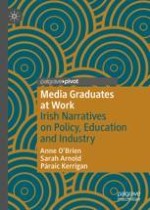2021 | OriginalPaper | Chapter
4. University Graduates from the Perspective of Creative Industries Employers
Authors : Anne O’Brien, Sarah Arnold, Páraic Kerrigan
Published in: Media Graduates at Work
Publisher: Springer International Publishing
Activate our intelligent search to find suitable subject content or patents.
Select sections of text to find matching patents with Artificial Intelligence. powered by
Select sections of text to find additional relevant content using AI-assisted search. powered by
